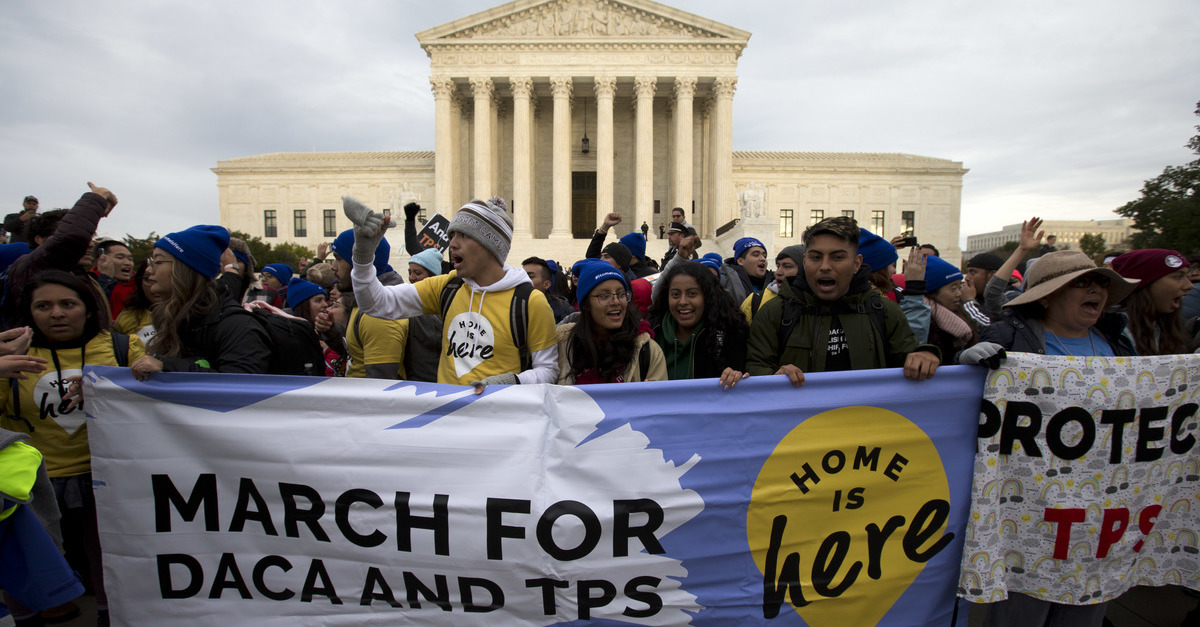
The Supreme Court will hear oral arguments on Tuesday in a case that has the potential to send shockwaves through the immigration law community. United States v. Sineneng-Smith could have chilling repercussions that cripple immigration advocacy and even the practice of immigration law.
Evelyn Sineneng-Smith is a U.S. citizen who worked as an immigration consultant in San Jose, California for almost 20 years; in her practice, she helped non-citizens navigate the American immigration system. Sineneng-Smith was charged in 2010 in connection with helping three undocumented workers and their employers complete applications for employment-based lawful permanent residence. Among the charges were three felony counts under 8 U.S.C. § 1324(a)(1)(A)(iv), for Sineneng-Smith’s use of “dangerous words,” and for “words and … deeds” aimed at “encourag[ing] or induc[ing] an alien to come to, enter, or reside in the United States.”
The government’s choice to prosecute Sineneng-Smith the way it did has raised many concerns. Sineneng-Smith told her clients that they were permitted to stay in the United States under a program that she knew had ended. For those actions, she was prosecuted and convicted of fraud. She appealed the fraud convictions, and her appeal was—not unsurprisingly — rejected. What was less commonplace, though, was Sineneng-Smith’s prosecution under 8 U.S.C. § 1324(a)(1)(A)(iv) – the “encouragement provision.” Even though there was already sufficient evidence to support the fraud conviction, the government chose to bring criminal charges based on immigration advocacy generally.
Sineneng-Smith now argues that the “encouragement provision” is facially unconstitutional in that it illegally abridges free speech. As the appeal heads to SCOTUS, many will be watching to see how far the conservative-leaning Court will go to uphold a rule that help may constitute a crime.
In her brief to the high court, Sineneng-Smith argued as follows:
The encouragement provision is not often charged, because the government does not need it to prosecute actual wrongdoers. But it remains on the books, and so long as it does, the threat of prosecution chills a substantial amount of protected speech. Indeed, when it is charged, the government trumpets its broad sweep—as it did in this case, before the Ninth Circuit correctly held that the encouragement provision is not only broad, but unconstitutionally overbroad.
Many amici, both within and without the immigration law community, have taken up Sineneng-Smith’s cause, arguing that the encouragement provision is simply too broad to withstand constitutional scrutiny. One such group is the National Association of Criminal Defense Lawyers, which pointed out “What encourages one person may not encourage another…”.
Writing for the Ninth Circuit, Judge A. Wallace Tashima agreed, concerned that general advocacy, or even a general social media post might constitute violation of the statute.
As a content-based restriction on speech, the encouragement provision must withstand the highest degree of constitutional muster. When analyzing whether a statute is indeed overbroad, a court will assess the proportion of legitimate appolications as compared with those that would be unconstitutional. After conducting such an analysis, the Ninth Circuit determined that the provision “criminalizes a substantial amount of protected expression in relation to the statute’s narrow legitimate sweep,” and struck it down on that basis.
Judge Tashima warned, quoting United States v. Stevens, that, “Even if [the government’s argument] were correct, it misses the point: “[T]he First Amendment protects against the Government; it does not leave us at the mercy of noblesse oblige. We would not uphold an unconstitutional statute merely because the Government promised to use it responsibly.”
Law&Crime spoke Monday with attorney and immigration law expert Afia Yunus.
Yunus said that if SCOTUS allows the encouragement provision to stand as the government advocates “it could potentially open the door to criminally prosecute lawyers and other grassroots advocates for fighting for the rights of the marginalized and discriminated communities of the U.S.”
The consequences, Yunus warned, could be sweeping.
“At the very least, this will have a chilling effect on advocates across the country,” she said. “It’s a sad day when our own government is putting change agents behind bars.”
[Photo by Jose Luis Magana Getty Images]